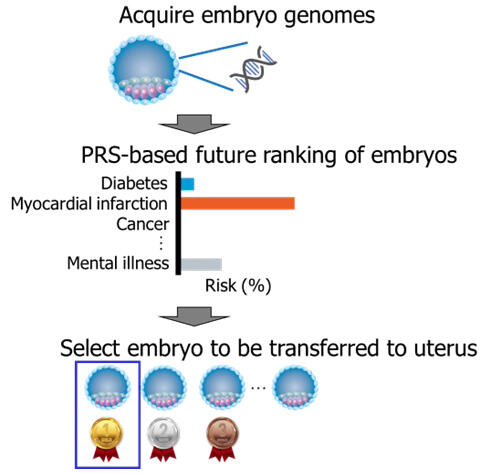A research group led by Visiting Academic Staff Shinichi Namba (also a Research Associate of the Graduate School of Medicine at the University of Tokyo), Professor Kazuto Kato, and Professor Yukinori Okada (also Professor of the Graduate School of Medicine at the University of Tokyo), Graduate School of Medicine at Osaka University, has identified the technical and ethical issues associated with PGT-P, a preimplantation genetic test that has recently been commercialized overseas to rank fertilized eggs based on predicted risk for genetic diseases. Together with other specialists, the research group developed and published recommendations about the issues. The research group used publicly available biobank data to compare various score methods for risk prediction. The comparison revealed that the ranking results depended substantially on the choice of score method, showing low reliability of the ranking results. The results were published in the October 14 issue of the international journal Nature Human Behaviour.

(Icons cited from DBCLS TogoTV (CC-BY-4.0) and Vecteezy.com)
Provided by Osaka University
Large-scale genome analyses (genome-wide association studies) have revealed that genetic polymorphisms are related to traits (disease risk and individual characteristics such as height and weight). Personalized therapy, in which this knowledge is used for early detection and prevention of diseases, is attracting increasing attention.
In this context, a preimplantation genetic test called "PGT-P" has been commercialized overseas. The test is used to rank embryos (fertilized eggs) based on polygenic risk scores (PRSs) obtained by aggregating the effects of individual's genetic polymorphisms in the entire genome on the traits. Some companies claim that the test can rank the embryos based on not only disease risks but also height and other traits.
In response, researchers and academic associations have raised concerns that "PGT-P" might lead to eugenic ideology and that it has technical and ethical problems. Moreover, no countries, including Japan, have established regulations on PGT-P. Other preimplantation genetic tests include PGT-A, PGT-SR, and PGT-M. These tests used in Japan were introduced to reduce embryo transfer, miscarriage, and the risk for serious hereditary diseases in infertility treatment after broad discussion.
To clarify the issues associated with "PGT-P," the research group focused on the various score methods used to improve the prediction performance of PRSs. They tested whether the ranking results depended on the choice of score method. Using publicly available genome data (about 50,000 people) from BioBank Japan, the largest biobank in Japan, 500 pairs were randomly generated on a computer. After simulating 10 embryo genomes for each pair, they applied 6 different score methods to these embryos to calculate PRSs for "height," which are considered relatively accurate. The PRS-based ranking results with different score methods were compared to see if they were in agreement with each other. All of the score methods selected were likely to be the basis for the calculation of PRSs for commercial use.
The results showed that the embryos ranked highly (considered to grow taller) differed depending on the choice of score method. The median agreement rate for the first-place embryo was just 30%. The median value of the frequency where the first-place embryo in one score method is the last place in another method and vice versa was about 6%. They also confirmed that similar results were obtained in PGT-P for type 2 diabetes, a disease for which the test is used. They have confirmed that this issue is not solvable by further increasing the scale of genome analysis. The reliability of the current "PGT-P" was shown to be insufficient for use in embryo selection. The test may also raise ethical issues because fertilized eggs ranked low are discarded. Based on these results, the research group organized a working group with experts in Japan in genomics, genetic diagnosis, and bioethics to resolve issues and develop and publish recommendations about them.
Namba said, "We need to properly communicate concerns about the reliability of PGT-P. It is important, of course, to avoid misleading expressions and ensure that users of the service are informed of the advantages and disadvantages of the service through procedures such as genetic counseling. In reality, however, there is a concern that such a system is not fully established. Based on the issues we have summarized here, particularly the concerns about reliability revealed in this study, discussion is needed about whether this service should be tolerated by society as a whole and how it should be regulated."
Journal Information
Publication: Nature Human Behaviour
Title: Inconsistent embryo selection across polygenic score methods
DOI: 10.1038/s41562-024-02019-y
This article has been translated by JST with permission from The Science News Ltd. (https://sci-news.co.jp/). Unauthorized reproduction of the article and photographs is prohibited.




